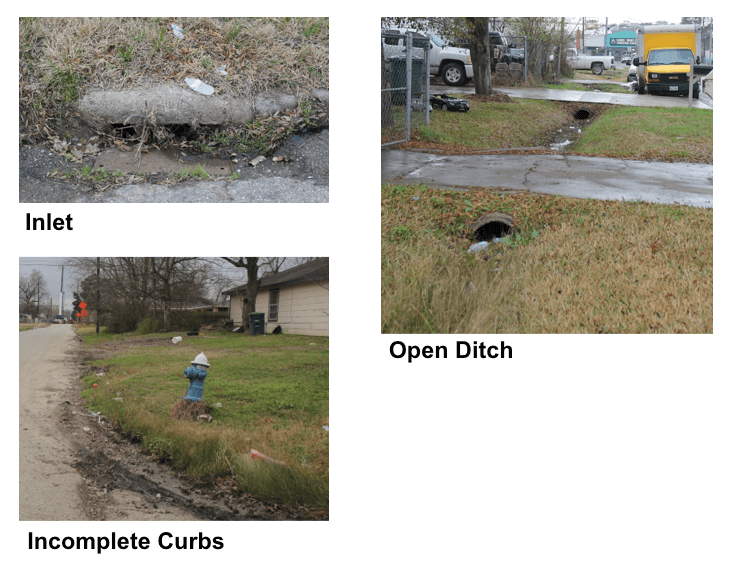Demanding Drainage Justice in Houston Through Evidence-Based Advocacy
Survivors As Experts
Formed during Hurricane Harvey by community members looking to help their neighbors survive and then recover from the historic floods of 2017, West Street Recovery (WSR) and its long-time partner, the Northeast Action Collective (NAC), are now focusing on changing the very systems that contribute to climate injustice in the majority Black and Brown neighborhoods of Northeast Houston. WSR and NAC’s current campaign for #DrainageJustice relies on old-fashioned community organizing and on deploying community members as researchers. This work aims to mitigate the disproportionate flooding risk residents now experience as a result of inadequate stormwater infrastructure and protect their public health; the resulting floodwaters are more likely to convey toxics and sewage than similar water in wealthier or whiter neighborhoods.
WSR and NAC were founded on the principle of Survivors as Experts: the idea that disaster survivors’ experiences and expertise matter, and that those residents “should have the most power to shape the solutions to the problems they face.” The organizations have embraced community-led research as a strategy. In September 2022, we highlighted a community mapping project WSR and NAC implemented using River Network’s Fostering Community-Led Research and Knowledge tool, to assess the financial and health impacts of flooding on residents (“Nothing About Us Without Us”). That project led the organizations to take a closer look at the factors that contribute to the disproportionate flooding exposure that residents in these neighborhoods experience.
Community Research and Advocacy for #DrainageJustice

Examples of inadequate infrastructure. Photo courtesy WSR/NAC.
The city of Houston has two distinct types of drainage: open-ditch, which arguably requires more frequent maintenance and whose maintenance is the responsibility of property owners; and curb-and-gutter drainage systems, which are maintained by the local Public Works Department. According to the recent Houston Chronicle article, Most of Houston’s Open Ditches are in Minority Neighborhoods, and Poor Maintenance Puts Them at Risk, “33% of open ditches are in areas where the majority of families live in poverty, compared with only 12% of curb and gutter structures in high poverty areas.” In 2014, the city’s own analysis found that 43% of open ditch drainage across the city was inadequate, and 88% of all open drainage ditches were located in majority-BIPOC census tracts.
To provide immediate relief, NAC members and volunteers regularly participate in drainage cleanup days to clear out blocked drains that cause water to back up in properties even during typical rain events. These floodwaters expose residents to environmental hazards, including bacteria dispersed by the flood waters from the leaking sewer system, which the City of Houston is under a consent decree to fix.
Last year, WSR, NAC, and their partner Texas Housers, a housing advocacy organization, began a new research project to compare the drainage systems in wealthy and low-income neighborhoods in Houston. A 17-person study group of NAC members and WSR and Texas Housers staff is evaluating drainage systems in various neighborhoods across Houston using the city’s own evaluation systems, visually assessing drainages through walking surveys. Preliminary study findings call into question the accuracy of the city’s “worst first” principle, which is supposed to guide how the city prioritizes investments in the drainage system. The findings also raise important questions about whether the city’s own evaluation protocols can identify ditches with the greatest potential to impact residents’ flooding and public health risks. As a next step in their research, the organizations are now finalizing a survey tool that residents will be able to use to collect additional information about the condition of drainages in their neighborhoods. Surveys will be geographically linked to their location, enabling the organizations to develop maps they can use to bolster their advocacy for increased investments.

NE Houston during May 9-11 rains. Photo courtesy WSR/NAC.
Even while their research continues, NAC is actively advocating for #DrainageJustice, asking the City of Houston to increase its fiscal year 2024 (FY2024) funding for new drainage projects and other flood management infrastructure maintenance and upgrades by $40 million. NAC and WSR remain optimistic that their months’ long effort to raise the visibility of drainage issues with community and City Council members will lead to approval of this funding increase at the June 7th City Council meeting, when the FY2024 budget will be approved. Regardless of the outcome of that vote, they remain committed to continuing their advocacy until they succeed.
Building Community Leadership for Long-Term Engagement
NAC, WSR, and Texas Housers volunteers, leaders, and staff are learning together about how their neighbors are impacted by instances of flooding and how to effectively advocate for themselves as a community. Becky Selle, WSR Co-Director for Research, explains, “What’s encouraging is that we’ve been right from the start. Everyone tried to tell us … that we don’t understand the bigger picture of how dollars are distributed and how the (drainage) systems work. They make it more complicated than it needs to be. Now we know that the hypothesis we originally put forth, which was based on everyone’s experience (with flooding) was correct.”
Through community-led research and community organizing, WSR and NAC are building the skills and expertise of local residents to engage in discussions of local water infrastructure needs and investments. For the residents in the majority-BIPOC neighborhoods of Northeast Houston, their demands for the city to provide pathways for meaningful public participation in drainage investment decisions is key to achieving the goal of #DrainageJustice, a key component to achieving racial justice in the City of Houston.






Ms. Toledo, there is a drainage infrastructure project ongoing in my neighborhood Bonita Gardens, neighbor to Trinity Gardens in Northeast Houston. The ditches that have been carved out are not safe, too deep, not uniform and lower property values. Many have no pathways causing pedestrians to walk in the street.
Laurie, I’m sorry to hear about the challenges created by what sound like improperly designed drainage ditches. Have you shared your concerns with West Street Recovery and the NAC? They have experience working through the 311 system to report issues w. the system. You may have already also contacted the Houston Dept. of Public Works – the name listed on their website who oversees ditch maintenance is Micheal Wilson, Deputy Asst. Director of Stormwater Maintenance at Houston Public Works. Getting municipalities’ attention on such issues typically requires patience and persistence!